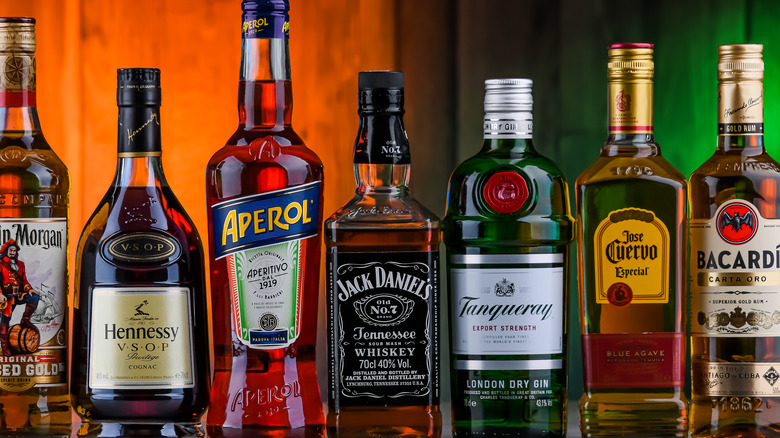Why The U.S. Treasury Is Being Sued Over Alcoholic Beverage Labels
The U.S. Treasury Department is facing a new lawsuit from a group of consumer advocates, though it's not about taxes. The lawsuit, which is being brought by the Center for Science in the Public Interest (CSPI) and more than 70 other consumer groups and individuals, to compel the Treasury to acknowledge their petition to require health and ingredient labels on alcoholic beverages.
If you're wondering why this issue is being brought before the Treasury instead of the U.S. Food and Drug Administration (FDA), which manages food labeling regulations, that's not unreasonable. The issue, as Vox explains, stems from the repeal of prohibition in the 1930s. After the sale of alcoholic beverages was re-legalized, the government wanted to tax it and created a special department within the Treasury to oversee that function. That department eventually evolved into the U.S. Bureau of Alcohol, Tobacco, Firearms and Explosives (ATF). However, when the ATF became part of the Department of Justice after Sept. 11, 2001, the responsibility of taxing and regulating most alcohol was retained by the Treasury in a division called the Alcohol and Tobacco Tax and Trade Bureau, or TTB (per TTB.org).
While the FDA has a long list of requirements for what information must be listed on food products, there are no such regulations on alcoholic beverages except for beers that aren't made with barley and wine with an alcohol content under 7% (which Vinepair explains fall into loopholes that put them under the FDA's supervision).
Fighting for transparency
CSPI has been trying for decades to get more comprehensive labels on alcohol (per Vox). In 2003, the Center, along with consumer advocates and colleges of public health, submitted a petition to mandate comprehensive labeling for alcohol. Vox explains that this was resisted by alcohol manufacturers who argued that labeling how little fat and carbs were in liquor would make people think it was healthy. The Treasury agreed, making labeling on alcohol bottles except for alcohol content optional for most beverages except beer, which has its own convoluted rules (per Vinepair).
CSPI's current lawsuit aims to compel the TTB to act on the group's long-standing petitions. The Center argues that knowing a serving size and how many calories are in it could potentially help Americans make healthier choices for their diets and reduce how much alcohol people consume by telling them how many normal drinks should be in a bottle. Additionally, labels would point out how many empty calories are consumed. The labels could also help people with allergies or other dietary concerns avoid hazardous ingredients.
"Imagine the chaos in the supermarket if food manufacturers could decide to list ingredients or not; decide to disclose calories or not; or include a uniform, easy-to-read label, or not," said CSPI president Dr. Peter G. Lurie. "Well, that's the kind of informational chaos we find today in the liquor store. After nearly 20 years of delay, it's time for the Treasury Department to bring some order to this uneven marketplace."

